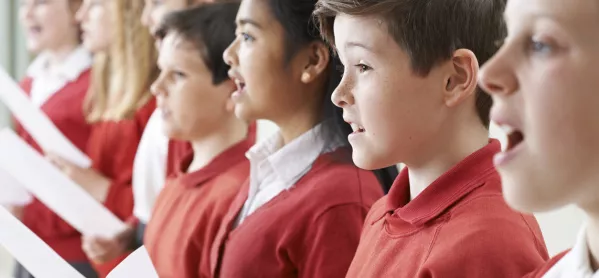School choirs are to be banned and large assemblies avoided when children return for the autumn term, the government has said.
As there is an “additional risk of infection” in environments where people are “singing, chanting, playing wind or brass instruments or shouting”, schools should avoid large group meetings where this would take place, according to guidance published today by the Department for Education (DfE).
And, if possible, the DfE recommends that music lessons take place outside, and pupils are positioned “back-to-back or side-to-side”.
DfE: Schools allowed to move their teachers between bubbles
Reopenings: ‘Extremely vulnerable’ teachers expected back in school
Guidance: School Covid outbreaks won’t ‘generally’ mean closures
It is also important that bubble groups are kept apart, meaning that schools should altogether “avoid large gatherings such as assemblies or collective worship with more than one group”, the department says.
In secondary schools, and particularly among older children, bubbles are “likely to need to be the size of a year group” to allow them to deliver a full range of subjects, the guidance states.
While in primary schools, as well as younger years at secondary, the DfE says schools “may be able to implement smaller groups the size of a full class”.
This may mean year-group assemblies are possible in some circumstances, but whole-school gatherings or mixed-year ensembles would certainly be off-limits.
The guidance states: “Schools should note that there may be an additional risk of infection in environments where you or others are singing, chanting, playing wind or brass instruments or shouting. This applies even if individuals are at a distance.
“Schools should consider how to reduce the risk, particularly when pupils are playing instruments or singing in small groups such as in music lessons by, for example, physical distancing and playing outside wherever possible, limiting group sizes to no more than 15, positioning pupils back-to-back or side-to-side, avoiding sharing of instruments, and ensuring good ventilation.
“Singing, wind and brass playing should not take place in larger groups such as school choirs and ensembles, or school assemblies.”
It adds: “Groups should be kept apart, meaning that schools should avoid large gatherings such as assemblies or collective worship with more than one group.”




